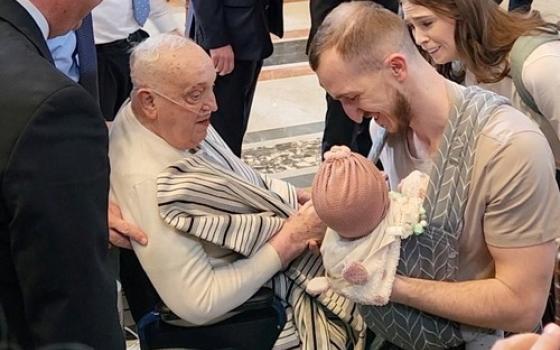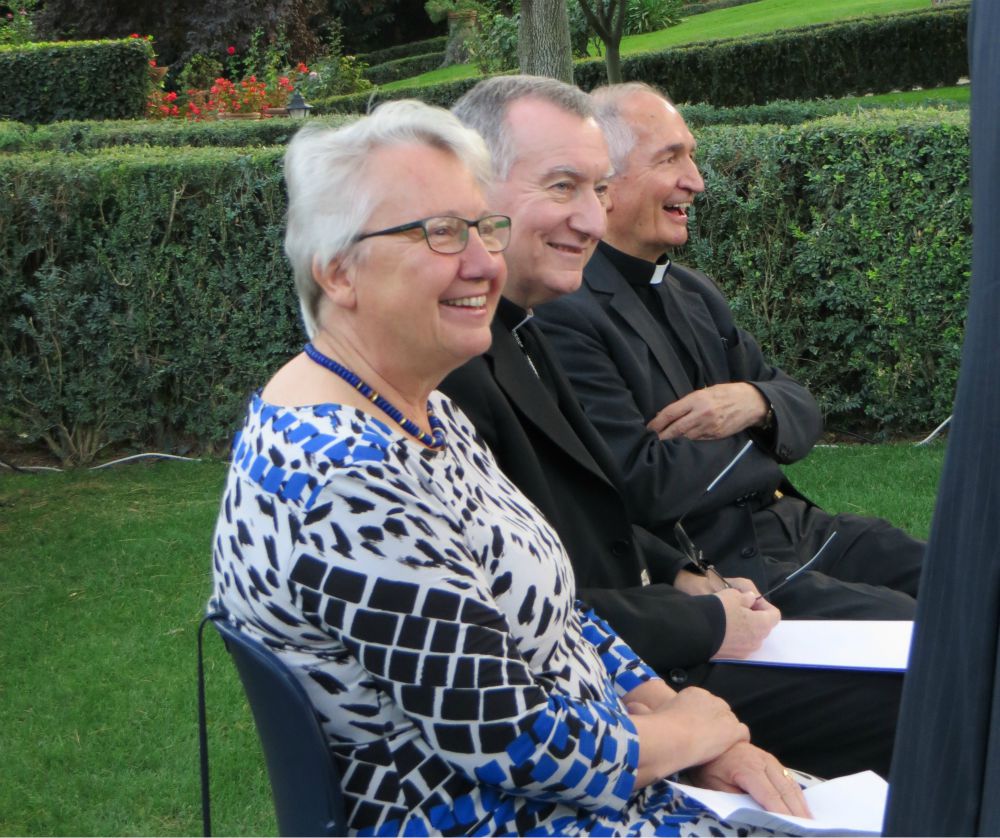
German ambassador to the Holy See Annette Schavan, Cardinal Pietro Parolin and Archbishop Silvano Tomasi are pictured at a U.S. embassy to the Holy See event Sept. 22. (Courtesy of the U.S. embassy to the Holy See)
The Vatican's longest-serving ambassador to the United Nations Office in Geneva has published a new book that collects 13 years of statements made by the official diplomatic arm of the Catholic Church, evincing some of the major developments in the church's social teaching since the onset of the new millennium.
In The Vatican in the Family of Nations, released in August, Archbishop Silvano Tomasi brings together hundreds of the diplomatic positions he took on behalf of the Holy See as its permanent observer in Geneva from 2003-16.
The result is a comprehensive, 872-page textbook that provides bountiful evidence for how the Catholic Church has addressed some of the pressing issues of our era: its continuing call for nuclear disarmament; its persistent efforts on behalf of record numbers of global refugees; and its denunciation of a global economy that Pope Francis says spreads a "throwaway culture," for example.
Cardinal Pietro Parolin, the Vatican's Secretary of State, provides a preface for the volume that outlines how he and Tomasi understand the work of the Catholic Church in the diplomatic realm.
Parolin says Tomasi's collection "represents a continued development of the social doctrine of the Catholic Church as new responses are given to the innovations and challenges introduced by technology and the changing geopolitical landscape."
"It is often said that the Holy See exercises 'soft-power' diplomacy, namely a diplomacy which does not depend on military, political or economic strength but on the ability to persuade," the cardinal writes in his preface. "The Holy See, one could say, acts as a voice of conscience, at the service of the common good."
Tomasi's book is organized into six chapters, each collating the Holy See's statements from the archbishop's time as permanent observer into separate themes on protection of the human person, religious and economic freedom, peacemaking, solidarity, and migration issues.
The volume also carries a concluding chapter summarizing the importance of the Vatican's diplomatic work by U.N. Secretary General António Manuel de Oliveira Guterres.
"The statements of the Holy See call for international relations inspired and governed by the principle of subsidiarity and solidarity," writes Guterres, who is also a former Prime Minister of Portugal. "This approach is all the more necessary at this time when we experience that multilateral consensus is continuously in crisis [and is] still subordinated to the decisions of a few."
Advertisement
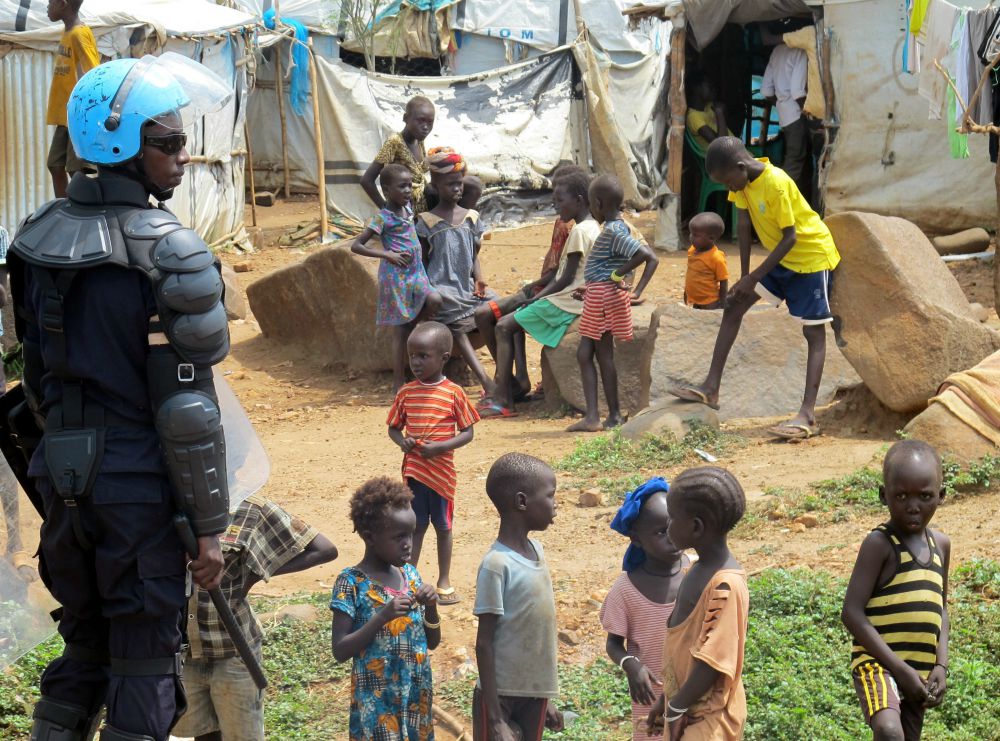
A U.N. peacekeeper keeps watch as children gather in a camp for displaced civilians in Juba, South Sudan in June. The heads of the member churches of the South Sudan Council of Churches criticized the country's political leaders "on all sides" for placing political and personal interests above the needs of ordinary people. (CNS/ Reuters /David Lewis)
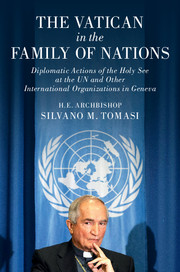
"Why is it so hard for the human family to imagine a different, better future based on the dignity of the human person?" he asks. "This question finds an answer in the statements of Archbishop Silvano Tomasi ... which present a clear ethical perspective."
"The active presence of the Holy See in Geneva ... reminds the world of the meaning of the brotherhood of nations," Guterres writes. "It is indeed a beacon of inspiration."
Some of the most notable developments in the church's social doctrine appear in the book's fourth and six chapters, which focus on the Vatican's positions on peacemaking and migration, respectively.
Tomasi's introduction to the chapter on peacemaking highlights particularly the church's evolving understanding of the morality of the global system of nuclear deterrence. The archbishop says a December 2014 message from Pope Francis to the Conference on the Humanitarian Impact of Nuclear Weapons is especially significant.
"The paper questions the ethical foundations of nuclear deterrence: the mere possession of nuclear weapons is per se immoral, and not just their use," writes Tomasi about the pope's message.
The chapter on migration highlights dozens of statements made by the Vatican during Tomasi's tenure in Geneva for better treatment of refugees escaping war, violence or famine.
"Why is it so hard for the human family to imagine a different, better future based on the dignity of the human person? This question finds an answer in the statements of Archbishop Silvano Tomasi ... which present a clear ethical perspective."
—U.N. Secretary General António Manuel de Oliveira Guterres
The statements often focus on the "ethical responsibility" for nations to welcome refugees, for international organizations to coordinate diverse national efforts, and, as an October 2011 statement to the U.N. Refugee Agency asks, for treatment of migrants not as "anonymous numbers" but people with "dignity, talents, and aspirations."
Besides his role at the U.N. in Geneva, Tomasi has also served the Holy See as its representative in the countries of Ethiopia, Eritrea and Djibouti, and as its observer to the African Union. A 77-year-old Scalabrinian priest, he is now serving as a delegated secretary for the Vatican's new Dicastery for Promoting Integral Human Development.
At a Rome book launch for The Vatican in the Family of Nations hosted by the U.S. embassy to the Holy See in September, Parolin praised Tomasi as an "exemplary voice" at the U.N. and called the book a "magnum opus" showing how the church puts its faith into practice.
The German ambassador to the Holy See, Annette Schavan, likewise said that Tomasi "is one of the most important diplomats and dialogue partners for us diplomats here in Rome."
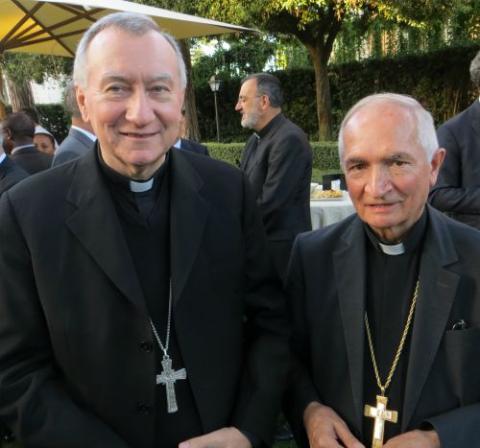
Cardinal Pietro Parolin, left, with Archbishop Silvano Tomasi at a U.S. embassy to the Holy See event Sept. 22 (Courtesy of the U.S. embassy to the Holy See)
"We are aware of the invaluable experiences he has gained over the years," she said. "We are aware of his ability to master the art of diplomacy and his deep sense for politics."
Marie Dennis, the co-president of global Catholic peace group Pax Christi International, said in a recent interview that Tomasi's contributions at the UN were "extremely important."
"He is extremely well informed, and at the same time, open to dialogue and new ideas," said Dennis. "He represents clearly the values of Catholic social teaching, navigating well the intersection of faith and political realism -- prophetic witness and pragmatic engagement in the public arena."
Eric LeCompte, who through his work as the executive director of the Jubilee USA Network came to know Tomasi as they both focused on debt, tax and trade issues at the U.N., said the archbishop is "on the forefront of articulating the church's social teaching."
"His recent book only shows a small part of his legacy," he continued. "He is one of the church's most effective diplomats. He is a moral force for good. I've watched him single-handedly move U.N. global agreements on financial policies that protect the poor, common good trade policies and disarmament."
"[Tomasi's] published speeches show his incredible love for the poor and tireless advocacy to build God's kingdom on Earth," he said.
[Joshua J. McElwee is NCR Vatican correspondent. His email address is jmcelwee@ncronline.org. Follow him on Twitter: @joshjmac.]



